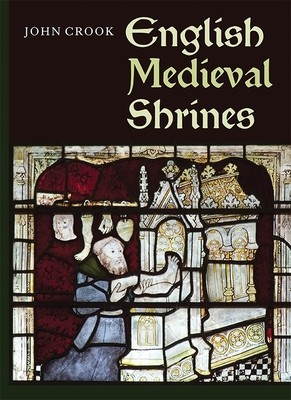
- We will send in 10–14 business days.
- Author: John Crook
- Publisher: Boydell Press
- ISBN-10: 1783270934
- ISBN-13: 9781783270934
- Format: 17.3 x 24.1 x 2.3 cm, softcover
- Language: English
- SAVE -10% with code: EXTRA
Reviews
Description
Survey of the growth and development of the magnificent shrines which reached their apogee during the middle ages.
The cult of saints is one of the most fascinating manifestations of medieval piety. It was intensely physical; saints were believed to be present in the bodily remains that they had left on earth. Medieval shrines were created inorder to protect these relics and yet to show off their spiritual worth, at the same time allowing pilgrims limited access to them.English Medieval Shrines traces the development of such structures, from the earliestcult activities at saintly tombs in the late Roman empire, through Merovingian Gaul and the Carolingian Empire, via Anglo-Saxon England, to the great shrines of the fourteenth and fifteenth centuries. The greater part of the bookis a definitive exploration, on a basis that is at once thematic and chronological, of the major saints cults of medieval England, from the Norman Conquest to the Reformation. These include the famous cults of St Cuthbert, St Swithun, and St Thomas Becket - and lesser known figures such as St Eanswyth of Folkestone or St Ecgwine of Evesham. John Crook, an independent architectural historian, archaeological consultant, and photographer, is the foremost authority on English shrines. He has published numerous books and papers on the cult of saints.
EXTRA 10 % discount with code: EXTRA
The promotion ends in 20d.03:02:39
The discount code is valid when purchasing from 10 €. Discounts do not stack.
- Author: John Crook
- Publisher: Boydell Press
- ISBN-10: 1783270934
- ISBN-13: 9781783270934
- Format: 17.3 x 24.1 x 2.3 cm, softcover
- Language: English English
Survey of the growth and development of the magnificent shrines which reached their apogee during the middle ages.
The cult of saints is one of the most fascinating manifestations of medieval piety. It was intensely physical; saints were believed to be present in the bodily remains that they had left on earth. Medieval shrines were created inorder to protect these relics and yet to show off their spiritual worth, at the same time allowing pilgrims limited access to them.English Medieval Shrines traces the development of such structures, from the earliestcult activities at saintly tombs in the late Roman empire, through Merovingian Gaul and the Carolingian Empire, via Anglo-Saxon England, to the great shrines of the fourteenth and fifteenth centuries. The greater part of the bookis a definitive exploration, on a basis that is at once thematic and chronological, of the major saints cults of medieval England, from the Norman Conquest to the Reformation. These include the famous cults of St Cuthbert, St Swithun, and St Thomas Becket - and lesser known figures such as St Eanswyth of Folkestone or St Ecgwine of Evesham. John Crook, an independent architectural historian, archaeological consultant, and photographer, is the foremost authority on English shrines. He has published numerous books and papers on the cult of saints.


Reviews